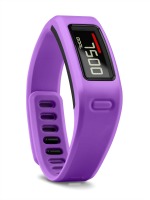 |
| Garmin vívofit |
Medidata ($MDSO) has struck a deal with Garmin to offer its clients the use of vívofit activity trackers in clinical trials. The choice of vívofit gives an indication of the characteristics clinical trial sponsors may prioritize as wearables start to take off in research.
Vívofit's standout feature is its battery, which lasts for one year. Many of its competitors from Fitbit, Jawbone and other companies need recharging every week or two. For consumers, the need to charge the device--and risk of forgetting to do so--is an annoyance. But for clinical trial sponsors, it increases the risk a participant will stop wearing the device, temporarily or permanently. When Medidata talks about why it chose vívofit, it is clear such compliance issues were a concern.
The press release touts the device's one-year battery life and water resistance, features that mean a participant can wear it 24/7 for the duration of many studies. Having struggled for years with clinical trial participants forgetting to complete patient-reported outcome (PRO) forms until the day of their site visit, the prospect of having technological shortcomings scuttle the dream of continuous data collection is unappetizing for sponsors. Vívofit should allay these concerns.
Aside from the battery life--which is achieved with a replaceable, nonrechargeable source--the features of the vívofit mirrors those of many of its rivals. The device tracks distance walked, steps taken, hours slept and calories burnt, is controlled by one button and shows fitness data on an LCD screen. In Medidata trials, all the data will be uploaded to its cloud-storage system, on which data crunchers can integrate the wearables' feed with traditional sources of clinical research information.
Doubts about the accuracy of data from wearables remain--a recent BBC investigation found up to 23% variation in daily distance covered across multiple brands--but the use of a single device in Medidata trials should ensure consistency. Manufacturers argue that while the distance covered or steps taken might not be 100% accurate, the trends will be.
- read the release